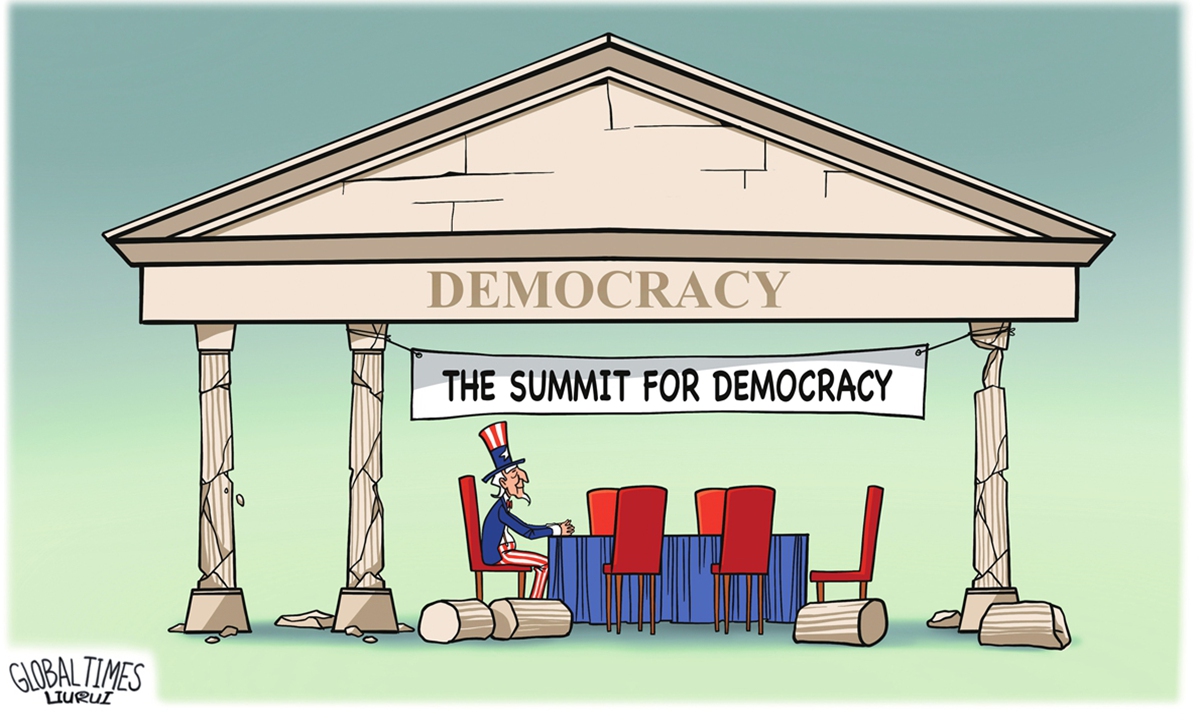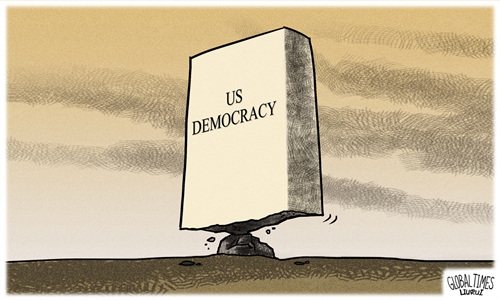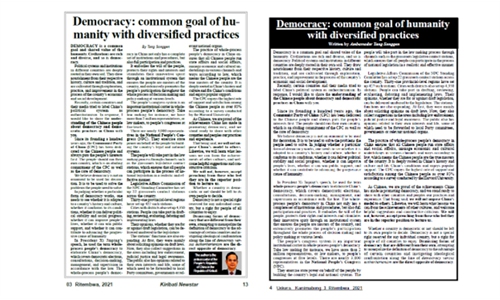
US democracy Illustration: Liu Rui/GT
Though announced with great fanfare, the US Summit for Democracy is clouded by concerns that it undermines democracy and creates fault lines that will leave the world worse off.US officials justify the gathering by claiming that "democracy is under threat." The justification sounds innocuous if it seeks to arrest the democratic "backsliding" in the US, a problem highlighted by the Sweden-based International IDEA think tank. However, if the summit aims to dictate what democracy should look like, the US would be perceived as acting in a presumptuous and even undemocratic way.
Shrouded in closed-door decision-making, the list of summit participants looks arbitrary. The optics are such that a political system can be defined as democratic only with Washington's say-so, even though many around the world have started to question if the US is in a position to make that call. The storming of the Capitol last January has made a mockery of American democracy. A recent Pew survey indicated that among 16,000 respondents across four continents, 83 percent do not view American democracy as a good example for other countries to follow.
In many cases, the US seems intent on narrowing the bandwidth of democracy. All too often, democracy is linked to whether there is a change in the ruling party. Countries that meet the criteria are counted as "democratic" while those that don't labeled as "authoritarian." But adopting a normative framework based on the experiences of a single country is not a fair way to measure democracy across the world.
Democracy comes in diverse forms and can be realized through different paths. While the international community does not have a consensus yet on the essential ingredients of democracy, two characteristics stand out if a democratic system is to be sustained.
First, democracy should be home-grown. Democratic institutions need to evolve with changes in demography and level of affluence in order to stay relevant. Impositions, such as forcing electoral democracy on a tribal society, often produces disasters. One does not have to look farther than Afghanistan to see that half-baked democracy does more harm than good.
Second, whether a country is democratic or not should be judged by its people, not a self-styled judge from outside. If a country with a government that enjoys elevated levels of public support is not recognized as a democracy, maybe it's time to rethink the definition of democracy rather than paint the country as an outlier.
More broadly, the summit is widely perceived as an assault on the sovereign equality of states. Countries, like humans, should have a right to choose without being subject to pressure or coercion. Demanding that invitees bring a "to-do list" to which they may be held accountable in the future creates an impression that they will either have to remake their system in the image of the US, or risk being kicked out of the club altogether. Such an approach could hardly be characterized as democratic.
Some might ask: Given the downsides, why does the US insist on holding such a summit anyway? A recent article published on the Brookings Institution's website may have offered a useful insight. It argues that the summit has a "larger geopolitical ambition" to "counter China's rise and continued Russian aggression."
In the midst of multiple global crises, surely it is the wrong time to create further divisions in the world. From the new COVID-19 variants to the functioning of global supply chains, from climate change to regional hotspots, today's challenges recognize no ideological lines. They can only be met by global solidarity and cooperation. Yet the summit hobbles both by heightening divisions between the West and the rest that hark back to the Cold War. Washington cannot expect Beijing and Moscow to accept criticisms that try to de-legitimize their systems and, at the same time, cooperate on a menu of issues desired by the US.
Take a glance at where the participants are on a world map, and one will get a clearer sense of Beijing's and Moscow's strong reaction. While most of their neighbors are being asked to join the gathering, nothing would look more like a thinly veiled attempt at strategic encirclement. How is China supposed to think when Taiwan, which an overwhelming majority of UN membership, including the US, sees as part of China, is on the invite list along with 100-plus sovereign states?
In short, the summit poisons the atmosphere for stable and cooperative relations between major powers and puts smaller countries in a bind. The US needs to ask itself whether making the world more fractured will help or hinder its goal of "Building Back Better World." Or does this "world" only consist of the US and the exclusive group of countries it has been trying to build?
The author is a Beijing-based commentator. opinion@globaltimes.com.cn



